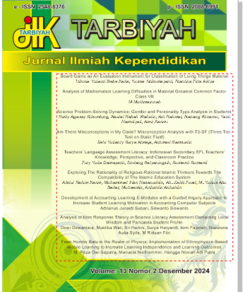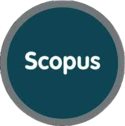The Use of Cell Phones in Accessing Social Media by Students During Learning Process in English Classroom
DOI:
https://doi.org/10.18592/tarbiyah.v13i2.14398Keywords:
cell phone, english classroom, learning process, social mediaAbstract
This study investigates a phenomenon in the educational world: using cell phones during teaching and learning in English classes. Cell phones here are referred to as inappropriate use, not as a supportive device in teaching and learning, reducing students' attention span. This research was conducted in 2 high schools, one in Lombok City, West Nusa Tenggara, and one in Banjarbaru City, South Kalimantan. Fifteen students were involved in this research as respondents, and 2 English teachers as informants. Random sampling was used to determine the research sample. Interview techniques were used to collect data. The research results indicated that all respondents used cell phones to access their social media accounts during the teaching and learning process in the class, ranging from 5 minutes to 30 minutes in 1 lesson to reduce boredom in class. A negative impact of using cell phones is that this action can divide and reduce students' attention to the lessons, which can ultimately reduce students' understanding of English subjects. The study recommends that teachers be aware of this phenomenon and always activate the students by presenting appropriate teaching methods and materials.References
Acharya, S., & Mohanty, S. (2014). Facebook as a Platform for Using English Language Skills among the Indian Youth. Journal of NELTA, 18(1–2), 1–17. https://doi.org/10.3126/nelta.v18i1-2.10326
Aktan, M. C., & Gökçearslan, E. (2022). Problematic Technology Use in University Students: Example of a Foundation University. International Journal of Technology in Education, 5(3), 470–485. https://doi.org/10.46328/ijte.317
Alalwan, N. (2022). Actual use of social media for engagement to enhance students’ learning. Education and Information Technologies, 27(7), 9767–9789. https://doi.org/10.1007/s10639-022-11014-7
Badri, M., Nuaimi, A. A., Guang, Y., & Rashedi, A. A. (2017). School performance, social networking effects, and learning of school children: Evidence of reciprocal relationships in Abu Dhabi. Telematics and Informatics, 34(8), 1433–1444. https://doi.org/10.1016/j.tele.2017.06.006
Barekat, N. A. (2023). The Effect of Board Games on the Academic Achievement and Learning Motivation of Fourth-Grade Elementary Student. International Journal of Elementary Education. https://doi.org/10.11648/j.ijeedu.20231203.13
Barton, B. A., Adams, K. S., Browne, B. L., & Arrastia-Chisholm, M. C. (2021). The effects of social media usage on attention, motivation, and academic performance. Active Learning in Higher Education, 22(1), 11–22. https://doi.org/10.1177/1469787418782817
Bermudez, C. M., Prasad, P. W. C., Alsadoon, A., & Hourany, L. (2016). Students perception on the use of social media to learn English within secondary education in developing countries. 2016 IEEE Global Engineering Education Conference (EDUCON), 968–973. https://doi.org/10.1109/EDUCON.2016.7474668
Boahene, K. O., Fang, J., & Sampong, F. (2019). Social Media Usage and Tertiary Students’ Academic Performance: Examining the Influences of Academic Self-Efficacy and Innovation Characteristics. Sustainability, 11(8), 2431. https://doi.org/10.3390/su11082431
Braun, V., & Clarke, V. (2014). What can “thematic analysis” offer health and wellbeing researchers? International Journal of Qualitative Studies on Health and Well-Being, 9(1), 26152. https://doi.org/10.3402/qhw.v9.26152
Chandrasena, P. P. C. M., & Ilankoon, I. M. P. S. (2022). The impact of social media on academic performance and interpersonal relations among health sciences undergraduates. Journal of Education and Health Promotion, 11(1), 117. https://doi.org/10.4103/jehp.jehp_603_21
Christiana Ijeoma, A. (2020). Integrating Learning Technologies (Mobile Devices) into the Teaching and Learning of English Language in Higher Institutions in Nigeria. Literacy Information and Computer Education Journal (LICEJ), 11(1), 3396–3402.
Demarcsek, R., & Todea, L. (2016). Some of the challenges of teaching multilevel classes and suggestions for how to deal with the situation. IOP Conference Series: Materials Science and Engineering, 144, 012015. https://doi.org/10.1088/1757-899X/144/1/012015
Dewi, K. P., & Rizal, D. (2023). The Use of Social Media in Improving EFL Learner Writing Skills. ELLITE: Journal of English Language, Literature, and Teaching, 8(1), 29–37. https://doi.org/10.32528/ellite.v8i1.13536
Feng, S., Wong, Y. K., Wong, L. Y., & Hossain, L. (2019). The Internet and Facebook Usage on Academic Distraction of College Students. Computers & Education, 134, 41–49. https://doi.org/10.1016/j.compedu.2019.02.005
Geng, H. (2021). Redefining the Role of Teachers in Developing Critical Thinking Within the Digital Era: 2021 International Conference on Modern Educational Technology and Social Sciences (ICMETSS 2021), Hangzhou, China. https://doi.org/10.2991/assehr.k.210824.005
Goh, Y. L. (2018). Usage Behaviours of Mobile Phone Among Teenagers and its Implications to Teenagers in Kuala Lumpur, Malaysia. The Journal of Social Sciences Research, SPI 2, 332–336. https://doi.org/10.32861/jssr.spi2.332.336
Gruzd, A., Haythornthwaite, C., Paulin, D., Gilbert, S., & Del Valle, M. E. (2018). Uses and Gratifications factors for social media use in teaching: Instructors’ perspectives. New Media & Society, 20(2), 475–494. https://doi.org/10.1177/1461444816662933
Hasan, H., Lai, C. C., Ibrahim, I. S., Awang Ahmad, S., & Meri, A. (2022). THE IMPACT ON USAGE OF SOCIAL MEDIA ON ACADEMIC PERFORMANCE AMONG UNIVERSITY STUDENTS IN SABAH – A CONCEPTUAL PAPER. International Journal of Law, Government and Communication, 7(30), 42–50. https://doi.org/10.35631/IJLGC.730005
Hidayati, I. S., Amin, M., & Lestari, Y. B. (2021). A Study on Teacher Strategies in Teaching Speaking and Reading Comprehension Skills: A Case Study at SMAN 8 Mataram: 2nd Annual Conference on Education and Social Science (ACCESS 2020), Mataram, Indonesia. https://doi.org/10.2991/assehr.k.210525.068
Iqbal, Z. (2018). The Impact of Social Media Usage on Academic Performance of University Students: Moderating Role of Time of Use. Pakistan Social Sciences Review, 2(I), 234–246. https://doi.org/10.35484/pssr.2018(2-I)19
Karjo, C. H. (2020). Fostering the Use of Social Media towards Students’ Learning. Journal of Physics: Conference Series, 1477(4), 042011. https://doi.org/10.1088/1742-6596/1477/4/042011
Khairi, S. S. M., & Ghani, R. A. M. (2019). Analysis of social networking sites on academic performance among university students: A PLS-SEM approach. 050015. https://doi.org/10.1063/1.5121120
Khalaf, A. M., Alubied, A. A., Khalaf, A. M., & Rifaey, A. A. (2023). The Impact of Social Media on the Mental Health of Adolescents and Young Adults: A Systematic Review. Cureus. https://doi.org/10.7759/cureus.42990
Kim, I., Kim, R., Kim, H., Kim, D., Han, K., Lee, P. H., Mark, G., & Lee, U. (2019). Understanding smartphone usage in college classrooms: A long-term measurement study. Computers & Education, 141, 103611. https://doi.org/10.1016/j.compedu.2019.103611
Mahsud, M., Khalaf, A. J. M., Mahsud, Z., Afzal, A., & Afzal, F. (2021). Addiction to smartphones leading to distraction in the classrooms: Effect of different cultures. Journal of Statistics and Management Systems, 24(4), 741–754. https://doi.org/10.1080/09720510.2020.1834660
Mohammad, H., Fayyoumi, A., & AlShathry, O. (2015). Do We Have to Prohibit the Use of Mobile Phones in Classrooms? International Journal of Interactive Mobile Technologies (iJIM), 9(2), 54. https://doi.org/10.3991/ijim.v9i2.4394
Mohd Yusoff, M. Z., & Abdul Hamid, H. (2022). SOCIAL MEDIA IMPACT ON THE PHYSICS STUDENTS. International Journal of Education, Psychology and Counseling, 7(48), 383–392. https://doi.org/10.35631/IJEPC.748029
Morphitou, R. N. (2014). The use of smartphones among students in relation to their education and social life. 2014 International Conference on Interactive Mobile Communication Technologies and Learning (IMCL2014), 315–319. https://doi.org/10.1109/IMCTL.2014.7011155
Mortensen, D. H. (2017). How to Do a Thematic Analysis of User Interviews. https://www.interaction-design.org/literature/article/how-to-do-a-thematic-analysis-of-user interviews?srsltid=AfmBOoqItOJmdEgbaf3IDnNVeQR7nQR1FBgeoKz_qt3AIj-aOc5zFtCM
Oguguo, B. C., Ajuonuma, J. O., Azubuike, R., Ene, C. U., Atta, F. O., & Oko, C. J. (2020). Influence of social media on students’ academic achievement. International Journal of Evaluation and Research in Education (IJERE), 9(4), 1000. https://doi.org/10.11591/ijere.v9i4.20638
Pratiwi, A. N., & Wiedarti, P. (2020). Making the Best Use of Social Media in English Classroom. Proceedings of the International Conference on Educational Research and Innovation (ICERI 2019). International Conference on Educational Research and Innovation (ICERI 2019), Yogyakarta, Indonesia. https://doi.org/10.2991/assehr.k.200204.036
Quy, N. H. (2019). Active Teaching Methods Applied in Training System towards SDIO Educational Framework. Proceedings of the 2019 4th International Conference on Distance Education and Learning, 137–141. https://doi.org/10.1145/3338147.3338154
Robinson, O. C. (2014). Sampling in Interview-Based Qualitative Research: A Theoretical and Practical Guide. Qualitative Research in Psychology, 11(1), 25–41. https://doi.org/10.1080/14780887.2013.801543
Shah, M. A. U. H., Ahmad, I., & Maqbool, M. A. (2019). SMARTPHONE ADDICTION: A BOON OR BANE FOR PAKISTANI UNIVERSITY STUDENTS. Global Political Review, IV(III), 20–27. https://doi.org/10.31703/gpr.2019(IV-III).03
Shittu, T. A., & Taiwo, Y. H. (2023). Acceptance of WhatsApp social media platform for learning in Nigeria: A test of unified theory of acceptance and use of technology. Journal of Digital Educational Technology, 3(2), ep2309. https://doi.org/10.30935/jdet/13460
Siddig, B. E. (2020). Social Media in Teaching of Languages. International Journal of Emerging Technologies in Learning (iJET), 15(12), 72. https://doi.org/10.3991/ijet.v15i12.12645
Siddiqui, S., & Singh, T. (2016). Social Media its Impact with Positive and Negative Aspects. International Journal of Computer Applications Technology and Research, 5(2), 71–75. https://doi.org/10.7753/IJCATR0502.1006
Sutisna, D., Widodo, A., Anar, A. P., Indraswati, D., & Nursaptini, N. (2020). Identification of Mobile Phone Usage’s Shifting Among Students. Tarbiyah : Jurnal Ilmiah Kependidikan, 9(2), 87. https://doi.org/10.18592/tarbiyah.v9i2.3519
Sutisna, D., Widodo, A., Nursaptini, N., Umar, U., Sobri, M., & Indraswati, D. (2020). An Analysis of the Use of Smartphone in Students’ Interaction at Senior High School. Proceedings of the 1st Annual Conference on Education and Social Sciences (ACCESS 2019). 1st Annual Conference on Education and Social Sciences (ACCESS 2019), Mataram, Indonesia. https://doi.org/10.2991/assehr.k.200827.055
Takieddin, S. Z., Alghamdi, F. S., Fida, H. L., Alghamdi, M. K., Kamfar, R. A., Alsaidlani, R. H., & Khojah, I. M. (2022). Effects of social networking services on academic performance and self-esteem: A cross-sectional study among medical students. Journal of Family Medicine and Primary Care, 11(10), 6221–6226. https://doi.org/10.4103/jfmpc.jfmpc_528_22
Tong, Y. (2018). A Study on the Influencing Factors and Countermeasures in College English Listening Teaching. Proceedings of the 2018 5th International Conference on Education, Management, Arts, Economics and Social Science (ICEMAESS 2018). Proceedings of the 2018 5th International Conference on Education, Management, Arts, Economics and Social Science (ICEMAESS 2018), Dalian, China. https://doi.org/10.2991/icemaess-18.2018.118
Zsila, Á., & Reyes, M. E. S. (2023). Pros & cons: Impacts of social media on mental health. BMC Psychology, 11(1), 201, s40359-023-01243–x. https://doi.org/10.1186/s40359-023-01243-x
Downloads
Published
How to Cite
Issue
Section
License
Copyright (c) 2024 Ridha Fadillah, Akhmad Adi Purnawarman

This work is licensed under a Creative Commons Attribution 4.0 International License.
Authors retain copyright and grant the journal right of first publication with the work simultaneously licensed under a Creative Commons Attribution 4.0 International License that allows others to share the work with an acknowledgment of the work's authorship and initial publication in this journal.




